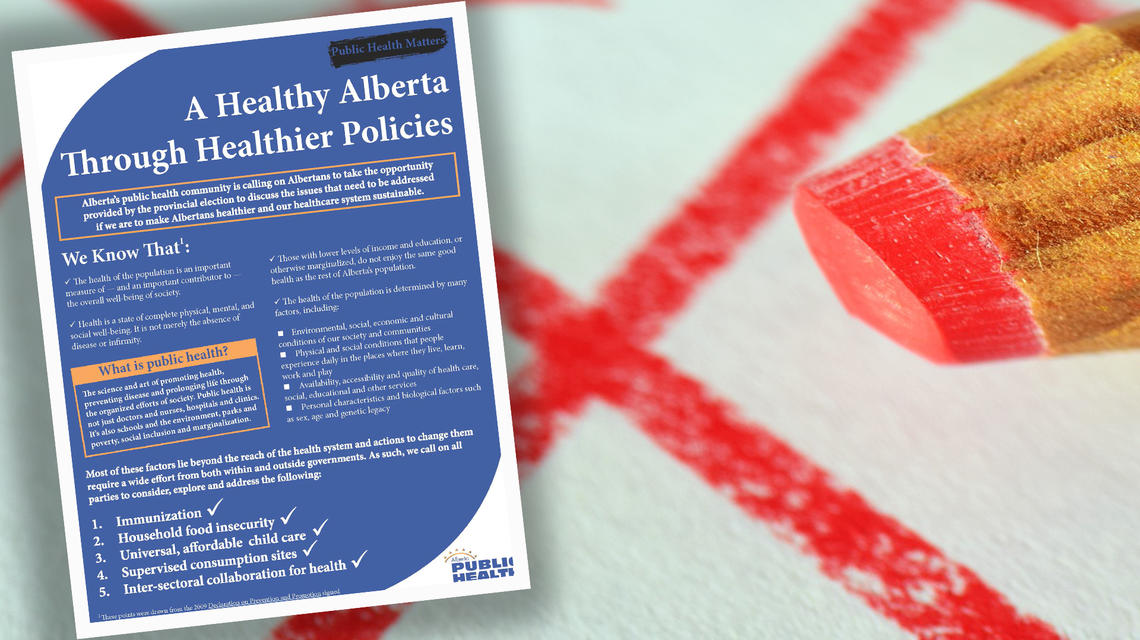April 9, 2019
Public health community calls on party leaders to create a healthier Alberta

Alberta's provincial election candidates will address the major health issues facing the province.
Alberta’s public health community is calling on candidates in the upcoming provincial election to make Albertans healthier and its health-care system more sustainable by looking beyond hospitals and clinics.
“There is a chronic disease epidemic in Alberta and infectious diseases are prevalent, both of which negatively impact the physical, mental, social and economic well-being of Albertans,” says Angeline Webb, Alberta Public Health Association (APHA) president. Webb adds that the burden of this epidemic rests disproportionately on those who are socially disadvantaged, leading to inequities in health.
“Many of these diseases can be prevented and health disparities reduced through policies that protect people from the factors that cause disease where they live, work, learn and play.”
On March 29, the APHA, in partnership with the O’Brien Institute for Public Health and the Alberta Policy Coalition for Chronic Disease Prevention (APCCDP), distributed a public health primer to party leaders outlining several of the biggest threats to health facing the province today. Those ideas will be debated at an all-party forum this Friday.
Co-hosted by the APHA, the O’Brien Institute and the APCCDP, the forum takes place on April 12, noon to 1:30 p.m. at the Central Public Library.
The primer outlines recommendations to address issues such as affordable child care, harm reduction strategies in the opioid crisis and household food insecurity.
“More than one in 10 Alberta households lack the money to buy enough food, which contributes to poor health and increased health-care costs,” says Webb.
A basic income guarantee, increasing income supports such as seniors' benefits, and a reduction in tax rates for lower-income Albertans are some of the strategies proposed in the primer to tackle food insecurity.
The issues that affect health are diverse and often fall outside of the traditional health-care system, says Michelle Louie, a policy analyst with the APCCDP. “By investing in and implementing healthy public policies, the government has the potential to improve the health of all Albertans, reducing the burden on the health system and saving money on health-care costs,” she says.
The primer also includes strategies to boost immunization rates in the province. An immunization rate of 95 per cent is required to protect populations during a measles outbreak, but only 79 per cent of Alberta kids had received the recommended two doses in 2017.
Addressing these issues will not only improve the lives of Albertans, but also reduce spending in the province, Webb adds.
“Vaccines save the health-care system money by preventing disease,” says Dr. William Ghali, MD, scientific director of the O’Brien Institute. Ghali would like to see whichever party is elected develop a detailed plan to address low immunization rates, and invest in resources for health-care providers to respond to ongoing vaccine hesitancy (the delay in accepting or refusal of recommended vaccines).
“The health of the population is an important measure of — and an important contributor to — the overall well-being of society,” says Ghali. “We are calling on all parties to consider public health policies that will help build a healthier Alberta.”
William Ghali is a professor in the departments of medicine and community health sciences, scientific director of the O’Brien Institute for Public Health and a member of the Libin Cardiovascular Institute of Alberta.
The O'Brien Institute for Public Health at the University of Calgary supports excellence in population health and health services research, while realizing the benefits of such research by using that knowledge to inform community, policy and health practice stakeholders.
The institute's membership includes more than 480 multidisciplinary researchers from 13 Cumming School of Medicine departments, nine additional University of Calgary faculties, including Nursing, Veterinary Medicine, Kinesiology and Arts; health professionals in Alberta Health Services; and, research users and policy makers from municipal and provincial institutions. As an institute, we share a vision of "better health and health care," reflecting our two priority research areas of Improved Population Health and Enhanced Health Systems Performance.
The institute's success in brokering broader external relationships with provincial and national interest groups, policy-makers, research agencies, the media, philanthropists, and community stakeholders, further extends the reach and impact of our members' significant research outputs.
